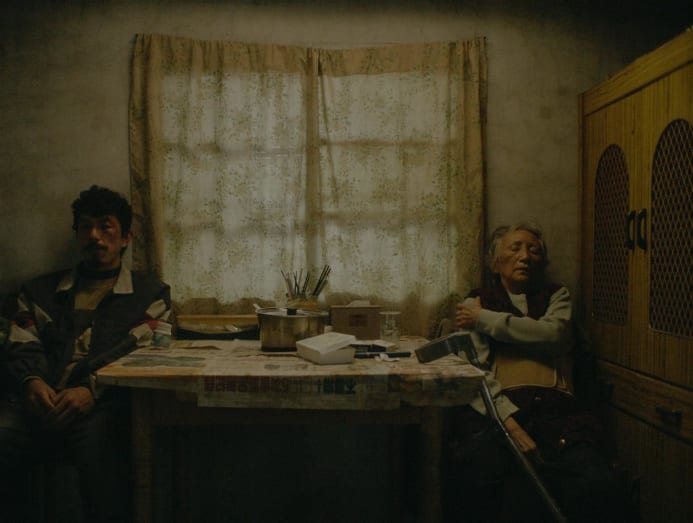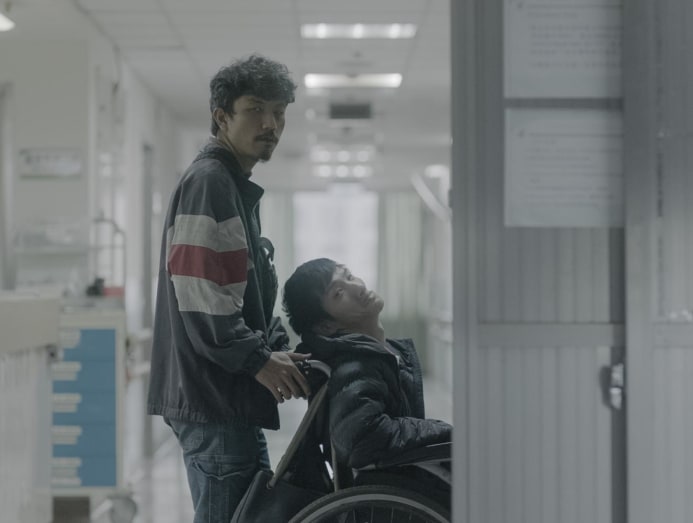Singapore director whose debut won rare honour at Cannes hopes film brings change for migrant workers

Mr Kuo Shu-wei (front row, centre), a Taiwanese man with cerebral palsy who has a role in the film Mongrel, rejoicing with Thai actor Wanlop Rungkumjad (front row, left) as Singaporean director Chiang Wei Liang clapped his hands behind them during the film premiere at the 77th Cannes Film Festival in France.
SINGAPORE — A painful family incident back in 2017 fuelled an interest in the plight of migrant workers for Singaporean director Chiang Wei Liang, whose debut film on these workers just won global recognition at the Cannes Film Festival in France.
Back then, when his aunt called him out of the blue asking for a spare set of keys for her flat, Chiang knew that something was amiss despite his aunt's calm voice.
He learnt that his uncle, who was locked inside his home, had collapsed from a stroke while she was at work. Since she was not home, paramedics could not open the house gate.
Unable to find the keys in his family home or his grandparents' home in the same housing block, Chiang rushed to his aunt's home while another relative headed to the nearby market to find a locksmith.
Although she was relied on to take care of my uncle who had suffered a stroke before, she was not trusted enough to own a set of keys. And that lack of trust had consequences.
When he arrived, he was greeted by a terrifying, chaotic situation — paramedics were shouting instructions through the flat's locked gates as his uncle lay motionless on the floor and their young domestic worker from Myanmar knelt by his uncle's side, rubbing his hands.
"The young girl didn't know what to do because she spoke little English. By all accounts, she was very attentive and responsible, having worked for my aunt for three years," Chiang, now 37, said in a video-call interview with TODAY.
"Although she was relied on to take care of my uncle who had suffered a stroke before, she was not trusted enough to own a set of keys. And that lack of trust had consequences."
Paramedics finally gained access to the flat but the stroke left his uncle bedridden.
Chiang, who has been mainly Taiwan-based for more than 15 years, was in Singapore at the time to become a caregiver for his sick mother and sister when the incident occurred.
The incident left him thinking about the relative trust that the family had placed in him compared to that in the domestic worker.
Later, while back in Taiwan working on a film, Chiang met a group of migrant workers moonlighting as caregivers for the old in the rural areas of Taiwan.
The similarities between them and his aunt’s helper in Singapore struck a chord — and he made it the centre of his debut feature film, Mongrel.
The two-hour film is centred around the character Oom, played by Thai actor Wanlop Rungkumjad. Oom is a Thai illegal worker who becomes a caregiver to a sick elderly woman and her handicapped son in the Taiwan mountains.


As Oom struggles under the unreasonable demands of his exploitative boss, he is forced to choose between dignity and survival.
The sombre film not only premiered at the Cannes Film Festival in France last month — it was also awarded the Camera d’Or Special Mention.
The Camera d'Or recognises the best first feature film at Cannes, while the special mention is for films that do not win the main prize but deserve recognition. It is not awarded every year and was last given out in 2009.
A film critic from Britain's newspaper The Guardian last month gave the film four stars out of five, saying it is a "Zen-like tale of compassion and suffering among migrant care workers".
In 2013, Singaporean film Ilo Ilo became the first film to win an award at the Cannes Film Festival when it clinched the Camera d’Or.
Although Mongrel may be the first Singapore film to get a special mention, Chiang admitted that his first reaction to learning of the award was concern about where to get outfits at short notice for his parents who were attending the ceremony.

Mongrel's producer Lai Wei Jie, 41, a Singaporean, told TODAY on Thursday (June 20): "We were definitely more excited about the film being selected for Cannes (than winning).
"There’s no better place for Mongrel… I cried while watching the premiere, even though I watched it at least 100 times before. It’s different (watching) it on the big screen."
DIVERSITY AND REALITY
While filming a scene mirroring the medical emergency that Chiang’s uncle went through, a man living near the filming site had a cardiac arrest. As they were in a rural mountainous area of Taiwan, the ambulance took 45 minutes to arrive.
Emergency medical technicians hired to act in the film rushed to the man's aid, but he could not be saved.
After the incident, filming resumed — capturing the raw emotions of the emergency medical technicians as they acted out a scene that almost mirrored the real-world drama that had played out minutes earlier.
The stark similarity left some of the crew shaken as they witnessed first-hand that Mongrel was more than a film — it was reality.
This essence of reality is captured in every detail in the film, the director and producers told TODAY.
The film was set in the mountains, for example, because these rural areas are where illegal migrant caregivers are heavily relied on to care for older residents living hours away from the nearest healthcare facility, Chiang explained.
The mountains are also where immigrants hide when they run away from their exploitative employers.
Chiang said that he also chose a Thai immigrant as the main character to pay homage to the Thais being the first foreign workers allowed to work in Taiwan in 1991.
When it came to casting, Chiang, Lai and co-producer Elizabeth Wijaya, 40, a Singapore permanent resident, said that they wanted the role of Hui, the handicapped man cared for by Oom, to be acted by a person with disabilities.
This was because Hui was the “emotional core” of the film, and they wanted an actor who could relate strongly.
To do so, they scoured Taiwan for an actor who was conscientious, could take directions, take part in acting workshops and commit to the gruelling production schedule.
They eventually cast Mr Kuo Shu-wei, a Taiwanese man with cerebral palsy who teaches other people with disabilities to use technology to communicate.
Despite his lack of acting experience, he quickly picked up some techniques from an acting coach on set.
Chiang also told TODAY that directing Mongrel would not have been possible without Lai and Wijaya’s help. The duo runs development and production company E&W Films.
"They are artisans (who are) willing to take on a film like Mongrel… you need to be gutsy and courageous enough to create this kind of film," Chiang said.
IMPACT AND PURPOSE
With reality so closely captured in the feature film, Chiang admitted that he struggled to understand the impact of the film, and wondered if there will be any impact at all.
Throughout his career, Chiang's films have often circled around the social issues of the Southeast Asian diaspora.
His 2017 short film Nyi Ma Lay is about foreign domestic workers in Singapore, while his 2018 VR film Only The Mountain Remains is about immigrants running away to Taiwan's mountains.
As the years went on, he got somewhat frustrated that little has been done to address the exploitation of Southeast Asian labour globally.
"This is the biggest question that I have had, to sum up my career of 15 years. What can I do, or what can the film do," he said, noting that legislative change still holds the biggest impact.
“A filmmaker receiving a prize at the most prestigious (film) festival in the world. Great. But what does the film do?”
Grappling with this, Chiang plans to take a break before he finds the next subject to spotlight in in his future work.
He also hopes to mentor a future generation of film-makers in Taiwan and Singapore.
What’s next for Lai and Wijaya? The couple are working to have Mongrel screened in Singapore, and are producing two other films at E&W Films. They did not share more details on the films.
And if Mongrel makes it to cinemas here, they hope that the audience will spend time pondering the marginalisation of migrant workers and the stressors of caregiving.
Wijaya noted that the film at least has an impact among audience members who watched the premiere at the Director's Fortnight at Cannes — the only section that allows the public to buy a ticket to watch films.
Some viewers told Chiang that they could relate to the caregiver's woes.
Wijaya said: "Legislative change is important to address these issues but so is movements of the heart. A film can also be about convincing certain feelings and emotions."









